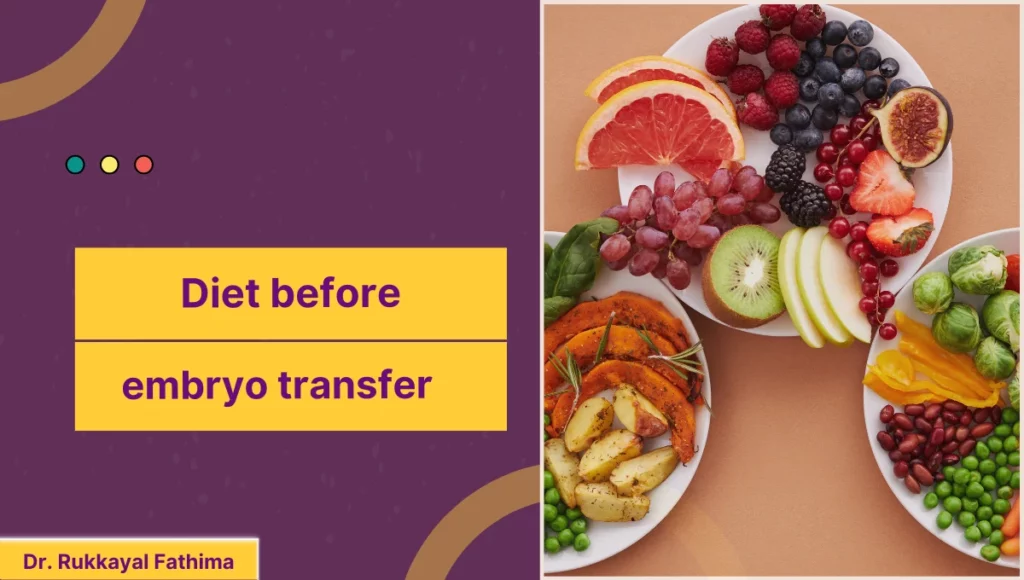Diet is an integral part of your IVF journey. Be it before, during, or after embryo transfer, the diet you follow is essential to give your body the essential nutrients it needs to achieve a successful pregnancy.
If you visit your fertility doctor for an IVF consultation, they will first tell you to maintain a healthy diet. Even if you have any health issues that hinder pregnancy, eating a healthy diet can help you manage the issues to some level.
It can also help your body prepare itself physically for embryo transfer by giving it the essential nutrients it needs. In this article, we’ll look at some of the best foods you can take before embryo transfer. We’ll also discuss what foods you should absolutely avoid during your treatments.
What To Include In Diet Before Embryo Transfer
Here are some foods and nutrients that can be a valuable addition to your pre-embryo transfer diet.
Organic Food
Organic foods, such as fruits, vegetables, whole grains, etc., are high in nutrients and can be very beneficial to your body. Certain organic fruits and vegetables can also improve your fertility and increase your chances of a successful embryo transfer.
They also potentially reduce the risk of pregnancy issues like preeclampsia, gestational diabetes, congenital disorders, etc.
Plant-Based And Healthy Fats
Fat is a necessary part of your healthy diet. However, you should only choose healthy fats like avocados, olive oil, coconut oil, salmon, nuts and seeds, etc.
However, try avoiding foods with unhealthy fats such as butter, white chocolate, biscuits, bacon, cheese, etc. They have been shown to reduce the number of eggs retrieved during IVF. This can potentially decrease your chances of having a successful pregnancy.
Plant-Based Proteins
Plant-based proteins, which can be found abundantly in foods such as kale, spinach, pumpkin, carrots, soya, gluten-free whole grains, etc., are essential for your body.
They are a healthier protein source than the proteins you get from animals and raw foods. They can increase your number of blood cells and improve your overall health for embryo transfer.
Vitamin D
Vitamin D has been shown to have a positive effect on implantation rate. They can also regulate hormone balance and help with ovulation. Sufficient Vitamin D intake before embryo transfer can potentially help increase implantation rate and help you have a healthy pregnancy.
Some Vitamin D-rich foods are fatty fish, dairy products, cod liver oil, eggs, etc. You can also bask in the sunlight regularly for some time to get natural Vitamin D.
Vitamin B12
Vitamin B12 is an essential vitamin that plays an important part in ovulation and pregnancy. Vitamin B12 deficiency is one of the most common causes of ovulation issues.
Consuming foods rich in Vitamin B12 can strengthen your endometrial lining and increase the implantation rate. Foods such as cheese, fish, beef, eggs, etc., are rich in Vitamin B12.
Lipoic Acid
Lipoic acid is an antioxidant and is an essential addition to your pre-embryo transfer diet. Lipoic acid has been shown to improve the female reproductive system and increase sperm quality and motility in men.
Foods such as red meat, broccoli, spinach, tomatoes, carrots, Brussels sprouts, etc., are rich sources of this antioxidant.
Omega-3 Fatty Acids
Not just before embryo transfer omega-3 fatty acid is an important nutrient that should be taken even after embryo transfer until your doctor asks you to stop.
They can help with embryo implantation and the baby’s development, and also reduce the risk of premature delivery. Omega-3 fatty acids are rich in foods such as walnuts, eggs, salmon, mackerel, pumpkins, etc.
Foods To Limit Or Avoid
Just like how you have so many healthy foods you need to add to your pre-embryo transfer diet, there are also foods you should definitely avoid if you want a healthy pregnancy. Here are some of these foods.
Caffeine
It is okay to take a limited amount of caffeine. However, a high amount of caffeine can affect your implantation rates.
Processed Foods
Processed foods are rich in sugars, unhealthy fats, and sodium and can lead to inflammation and other complications. They are also a major cause of issues like Type 2 diabetes. All these can affect your reproductive health and decrease your IVF success rate.
Raw Or Undercooked Foods
Raw or uncooked foods can have certain bacteria and other germs that can cause diseases and affect your body. Ensure your foods are thoroughly cooked to kill off these germs and have a high success rate.
Foods High In Mercury
Mercury has been shown to affect the baby’s brain development and can be quite harmful to both the mother and baby. Several fishes, like king mackerel, swordfish, shark, etc., are rich in mercury.
So, if you are adding fish to your diet, ensure it is a low-mercury fish variety like salmon, catfish, pollock, shrimp, etc.
Soy Products
Processed soy products, such as soy powder, soy milk, soy meat, etc., can cause hormonal balance issues. This can affect your embryo implantation rate and the development of the baby.
Conclusion
These are some of the foods you should take and avoid before your embryo transfer. All these foods are nutritious and can improve your overall health and fertility.
Consult your fertility doctor if you have any doubts regarding what you can and cannot do during your IVF treatments.
Here are some foods you can eat before embryo transfer to prepare your body for pregnancy.
- Organic foods
- Healthy fruits and vegetables
- Plant-based healthy fats
- Foods rich in Vitamin B12 & D
Take adequate rest, do regular exercise, and follow your doctor’s instructions sincerely. Stay calm, and don’t stress over the results. Your doctor will stay with you and ensure you have a successful pregnancy.
You will be asked to drink plenty of water and other liquids before embryo transfer. The embryo transfer will be performed using an ultrasound, which requires your bladder to be full. It might cause discomfort, but bear with it for a while.





